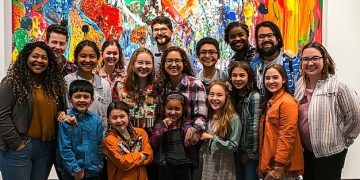Individualism vs. Teamwork: US Culture in 2025

Anúncios
In 2025, the US cultural emphasis on individualism presents both challenges and opportunities for teamwork, requiring a nuanced approach to leadership, communication, and collaboration to foster effective team dynamics.
How will America’s strong focus on individual achievement affect our ability to work together in teams by 2025? The answer is complex, involving shifts in how we lead, communicate, and collaborate.
Anúncios
Understanding US Individualism
The United States has long been recognized for its strong emphasis on individualism. This cultural trait shapes various aspects of American life, from personal aspirations to professional conduct, and profoundly impacts how teams function.
What exactly defines this concept of individualism in the American context?
Anúncios
The Roots of American Individualism
American individualism is deeply rooted in historical and philosophical ideals. The nation’s founding principles, emphasizing personal freedom and self-reliance, have contributed to a culture that values individual achievement and independence.
How does this historical context translate into modern workplaces?
Manifestations in Modern Society
In contemporary American society, individualism manifests in several ways. It fosters a competitive spirit, where individuals are driven to excel in their respective fields. It also encourages self-expression and the pursuit of personal goals, often prioritizing individual needs over collective ones.
- Emphasis on Personal Achievement: Rewards and recognition often focus on individual performance metrics.
- Independent Decision-Making: Employees are encouraged to take initiative and make autonomous decisions.
- Direct Communication Style: Individuals tend to express their opinions directly, sometimes without considering the impact on group harmony.

In conclusion, understanding the roots and modern manifestations of American individualism is crucial for navigating its impact on teamwork as we move toward 2025.
The Impact on Team Dynamics
The strong emphasis on individualism significantly influences team dynamics within US organizations. While it can foster innovation and drive, it also presents challenges related to collaboration, communication, and conflict resolution.
How does individualism specifically affect these key areas of teamwork?
Collaboration Challenges
One of the primary challenges is aligning individual goals with team objectives. Individualistic cultures may lead to a focus on personal recognition, potentially undermining collaborative efforts aimed at achieving collective goals.
What strategies can mitigate these challenges?
Communication Barriers
Individualistic communication styles, which often prioritize directness and assertiveness, can sometimes create barriers to effective teamwork. Differing opinions may be expressed without sensitivity, leading to misunderstandings and conflicts.
- Lack of Active Listening: Team members may be more focused on expressing their own ideas than attentively listening to others.
- Limited Information Sharing: Individuals may hesitate to share knowledge or resources, fearing it could diminish their competitive advantage.
- Resistance to Compromise: Strong individual opinions might make finding common ground more difficult.
Potential for Innovation
Despite the challenges, individualism can also foster innovation within teams. The encouragement of independent thinking and self-expression can lead to diverse perspectives and creative solutions. When channeled effectively, individualistic drive can enhance team performance.

In conclusion, the impact of individualism on team dynamics is multifaceted. Understanding both its drawbacks and potential benefits is essential for creating effective and harmonious teams.
Evolving Leadership Strategies
In light of the challenges posed by individualism, leadership strategies must evolve to foster collaboration and cohesion. Effective leadership can bridge the gap between individual aspirations and collective goals.
What are some strategies that leaders can employ to navigate these complexities?
Emphasizing Shared Goals
One crucial approach is to emphasize shared goals and values. Leaders should clearly communicate the importance of collective objectives, highlighting how individual contributions support the overall team success.
How can leaders effectively communicate these shared goals?
Promoting Inclusive Communication
Leaders must promote inclusive communication practices. Encouraging active listening, providing constructive feedback, and creating a safe space for diverse opinions are essential for fostering open dialogue and mutual understanding.
- Facilitate Open Discussions: Create structured opportunities for team members to share their ideas and concerns.
- Encourage Constructive Feedback: Implement feedback mechanisms that promote growth and improvement.
- Mediate Conflicts: Develop skills to address conflicts fairly and constructively.
Recognizing Team Contributions
While individual achievement is valued, it’s equally important to recognize team contributions. Celebrating collective successes can reinforce the importance of collaboration and strengthen team bonds. Leaders should strive to balance individual recognition with acknowledgments of team efforts.
In conclusion, evolving leadership strategies that emphasize shared goals, promote inclusive communication, and recognize team contributions are critical for fostering effective teamwork.
Technological Influences on Teamwork
Technology plays a pivotal role in shaping modern teamwork. As we head into 2025, understanding the technological influences on collaboration is crucial, especially in individualistic cultures.
How does technology impact teamwork dynamics in an individualistic context?
Digital Collaboration Tools
Digital collaboration tools, such as project management software, video conferencing, and instant messaging, facilitate teamwork by enabling communication and information sharing across geographical boundaries. These tools can enhance efficiency and productivity, but their effectiveness depends on how well they’re integrated into team processes.
How can organizations optimize technological tools for collaboration?
Remote Work Dynamics
The rise of remote work presents unique challenges and opportunities. While remote work offers flexibility and autonomy, it can also exacerbate feelings of isolation and detachment. Leaders must leverage technology to foster a sense of connection and community among remote team members.
- Virtual Team-Building Activities: Organize online games, virtual coffee breaks, and other social events to foster camaraderie.
- Regular Check-Ins: Schedule regular check-in meetings to provide support, address concerns, and maintain engagement.
- Utilize Collaboration Platforms: Choose platforms that support real-time communication and collaborative document editing.
Data-Driven Insights
Data analytics can provide valuable insights into team performance and dynamics. Analyzing communication patterns, task completion rates, and other metrics can help identify areas for improvement and optimize team processes. Using data effectively can foster a more transparent and results-oriented team environment.
In conclusion, technological influences on teamwork are profound and multifaceted. Leveraging digital tools, managing remote work dynamics, and utilizing data-driven insights are essential for fostering effective collaboration.
The Role of Cultural Intelligence
Cultural intelligence (CQ) refers to the ability to understand, interpret, and adapt to different cultural contexts. In an increasingly globalized world, CQ is becoming an essential skill for effective teamwork, especially in the United States.
Why is cultural intelligence crucial for navigating individualism in teamwork?
Understanding Cultural Differences
Cultural intelligence involves recognizing and appreciating cultural differences in communication styles, values, and expectations. By understanding these differences, team members can navigate potential misunderstandings and conflicts more effectively.
How can team members develop their cultural intelligence?
Promoting Empathy and Respect
CQ fosters empathy and respect among team members. It encourages individuals to consider the perspectives of others and to value diverse opinions and experiences. This creates a more inclusive and collaborative team environment.
- Cross-Cultural Training: Provide training programs that enhance awareness and understanding of different cultural norms and values.
- Diverse Team Composition: Encourage the formation of diverse teams that bring together individuals from various cultural backgrounds.
- Facilitate Cultural Exchange: Organize activities that promote cultural exchange and learning.
Conflict Resolution Strategies
Cultural intelligence can also improve conflict resolution strategies. By understanding the cultural roots of conflicts, team members can approach disagreements with greater sensitivity and find solutions that respect the needs and values of all parties involved.
In conclusion, cultural intelligence plays a vital role in fostering effective teamwork in the face of individualism. Promoting empathy, understanding cultural differences, and improving conflict resolution strategies are key to building cohesive and productive teams.
Future Trends and Predictions
Looking ahead to 2025, several trends and predictions can shed light on how individualism will continue to shape teamwork in the United States.
What are some possible scenarios and implications for the future?
Generational Shifts
As younger generations enter the workforce, their values and expectations will influence team dynamics. Millennials and Gen Z tend to prioritize work-life balance and purpose-driven work, which may impact their approach to teamwork compared to previous generations. Understanding these generational shifts is crucial for fostering effective collaboration.
How can organizations adapt to these generational differences?
Increased Globalization
Globalization will continue to expand, leading to more diverse and geographically dispersed teams. Managing cross-cultural collaboration will become even more critical, requiring organizations to invest in cultural intelligence training and technologies that facilitate remote communication.
- Virtual Reality Collaboration: VR technology can create immersive virtual environments, allowing remote team members to interact in more engaging and realistic ways.
- AI-Powered Communication Tools: AI can assist with language translation, sentiment analysis, and other aspects of communication, helping to bridge cultural gaps.
- Focus on Inclusivity: Organizations will need to prioritize creating inclusive environments where all team members feel valued and respected.
Emphasis on Agility and Adaptability
The business environment is becoming increasingly dynamic and unpredictable. Teams will need to be agile and adaptable to respond effectively to changing market conditions. Individualistic team members can contribute to this agility by bringing diverse perspectives and a willingness to experiment.
In conclusion, future trends and predictions suggest that individualism will continue to play a significant role in shaping teamwork. Understanding generational shifts, embracing globalization, and emphasizing agility and adaptability are essential for building effective and resilient teams.
| Key Aspect | Brief Description |
|---|---|
| 🤝 Collaboration | Balancing individual goals with team objectives remains crucial. |
| 🗣️ Communication | Inclusive and empathetic communication is key to overcoming barriers. |
| 🌐 Cultural Intelligence | Understanding and adapting to cultural differences enhances teamwork. |
| 🚀 Technology | Leveraging digital tools to connect remote teams and data analytics for better team insights. |
Frequently Asked Questions
▼
Leaders can emphasize shared goals by clearly communicating team objectives and illustrating how individual contributions support the collective success. Regular alignment meetings are beneficial.
▼
Effective remote team-building strategies include virtual coffee breaks, online games, and collaborative project tasks. These activities help foster social connections and camaraderie.
▼
Cultural intelligence enhances conflict resolution by fostering empathy and understanding of different cultural norms. This allows team members to approach conflicts with greater sensitivity.
▼
Technology, such as AI-powered translation tools and VR collaboration platforms, helps bridge cultural gaps by facilitating communication and creating more engaging virtual environments.
▼
Organizations can adapt by understanding the values and expectations of each generation. Millennials and Gen Z often prioritize work-life balance and purpose-driven work, needing flexible arrangements.
Conclusion
In conclusion, navigating the impact of US individualism on teamwork in 2025 requires a balanced approach that leverages the strengths of individualistic drive while fostering collaboration, inclusivity, and cultural intelligence. By embracing evolved leadership strategies, leveraging technology effectively, and understanding future trends, organizations can build resilient and high-performing teams that thrive in an increasingly dynamic world.





